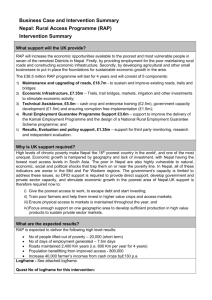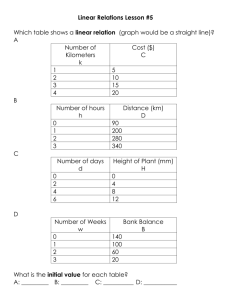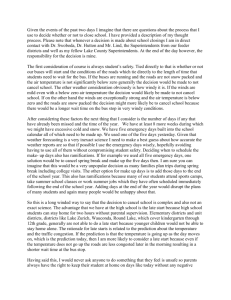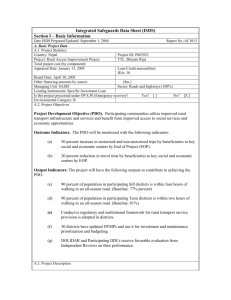World Bank Provides Additional Assistance to Road Sector (RAIDP)
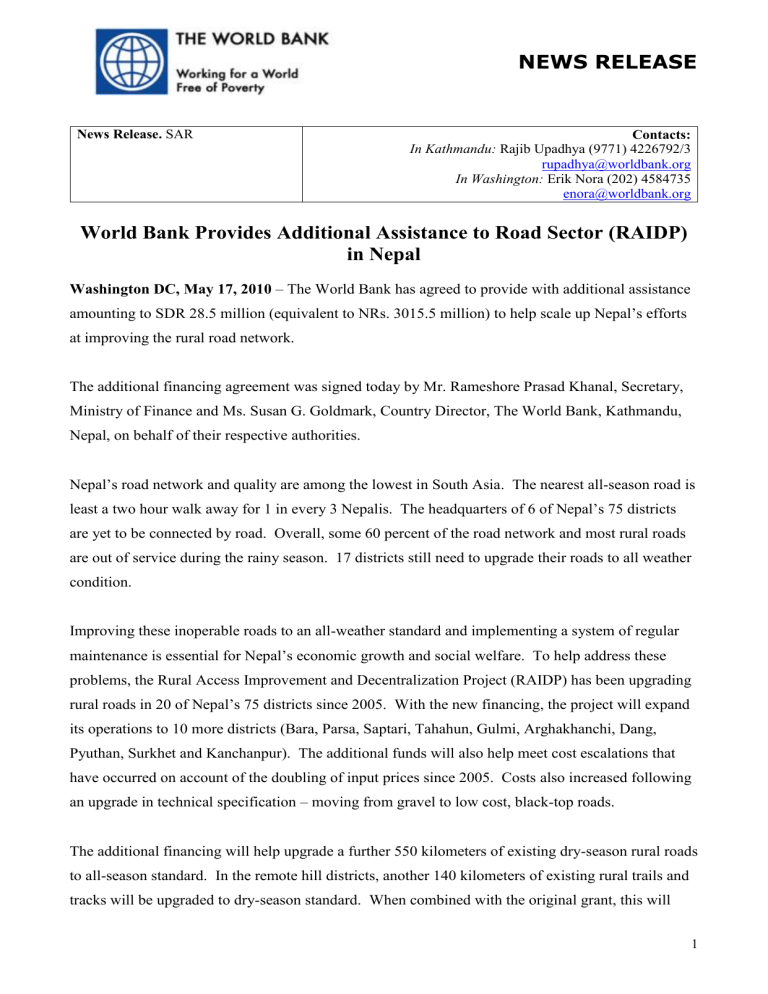
NEWS RELEASE
News Release. SAR Contacts:
In Kathmandu: Rajib Upadhya (9771) 4226792/3 rupadhya@worldbank.org
In Washington: Erik Nora (202) 4584735 enora@worldbank.org
World Bank Provides Additional Assistance to Road Sector (RAIDP) in Nepal
Washington DC, May 17, 2010 – The World Bank has agreed to provide with additional assistance amounting to SDR 28.5 million (equivalent to NRs. 3015.5 million) to help scale up Nepal’s efforts at improving the rural road network.
The additional financing agreement was signed today by Mr. Rameshore Prasad Khanal, Secretary,
Ministry of Finance and Ms. Susan G. Goldmark, Country Director, The World Bank, Kathmandu,
Nepal, on behalf of their respective authorities.
Nepal’s road network and quality are among the lowest in South Asia. The nearest all-season road is least a two hour walk away for 1 in every 3 Nepalis. The headquarters of 6 of Nepal’s 75 districts are yet to be connected by road. Overall, some 60 percent of the road network and most rural roads are out of service during the rainy season. 17 districts still need to upgrade their roads to all weather condition.
Improving these inoperable roads to an all-weather standard and implementing a system of regular maintenance is essential for Nepal’s economic growth and social welfare. To help address these problems, the Rural Access Improvement and Decentralization Project (RAIDP) has been upgrading rural roads in 20 of Nepal’s 75 districts since 2005. With the new financing, the project will expand its operations to 10 more districts (Bara, Parsa, Saptari, Tahahun, Gulmi, Arghakhanchi, Dang,
Pyuthan, Surkhet and Kanchanpur). The additional funds will also help meet cost escalations that have occurred on account of the doubling of input prices since 2005. Costs also increased following an upgrade in technical specification – moving from gravel to low cost, black-top roads.
The additional financing will help upgrade a further 550 kilometers of existing dry-season rural roads to all-season standard. In the remote hill districts, another 140 kilometers of existing rural trails and tracks will be upgraded to dry-season standard. When combined with the original grant, this will
1
result in 1,165 kilometers of all season rural roads and 211 kilometers of dry season roads. It will also maintain about 4,500 kilometers of rural roads, build 317 trail bridges and river crossings, and develop small community infrastructures to improve access to services and economic opportunities.
The additional financing is expected to create 150 days a year of off-farm employment for over
30,000 people. Overall, approximately 2.4 million people are expected to benefit by the time the project ends in 2013.
Ms. Susan Goldmark, the World Bank Country Director for Nepal congratulated for the persistent and laborious dedication to be able to come to this point overcoming all the challenges.
Ms. Goldmark said “
Having been together in the business of building rural roads for the past 16 years, you all have had some very practical solutions to offer. In order to mitigate risks in this project, we have agreed to build in specific measures. For example, project funds will be allocated to the districts on the basis of performance and risks to implementation. But risks can be highly localized. For example, under the ongoing project, Udaypur received 180 million Rupees, the highest for all districts. Mahottari, not too far away, received only 9 million Rupees, the lowest for all districts. To make this mechanism work, the assessment of performance and risk will require intense, perpetual monitoring. Other innovations we have included are the piloting of e-bidding in
10 districts to help overcome problems related to intimidation and collusion; the introduction of complaint redressal systems to ensure compliance with environmental and social safeguards; and stringent quality assurance, including action such as blacklisting of firms, against poor performing contracts.” Ms. Goldmark added “Let me assure you that many of these measures enjoy wide public support as we discovered in the last few months when the ADB, DFID and the World Bank organized a series of field consultations with stakeholders and beneficiaries from 48 districts. The participants at these workshops were fully aware about problems of public procurement and quality. Moreover, they were overwhelmingly in favor of transparent, participatory monitoring and sanctions against poor performance.”
The RAIDP additional financing is a blend of grant assistance of SDR 12.8 million (equivalent to
NRs. 1354.3 million) and loan assistance of SDR 15.7 million (equivalent to NRs. 1661.2 million).
For more information on the Bank’s work in Nepal, please visit http://www.worldbank.org.np
For project information, please visit: http://www.worldbank.org.np/external/projects/main?pagePK=64283627&piPK=73230&theSitePK=
223555&menuPK=286969&Projectid=P107853
2
